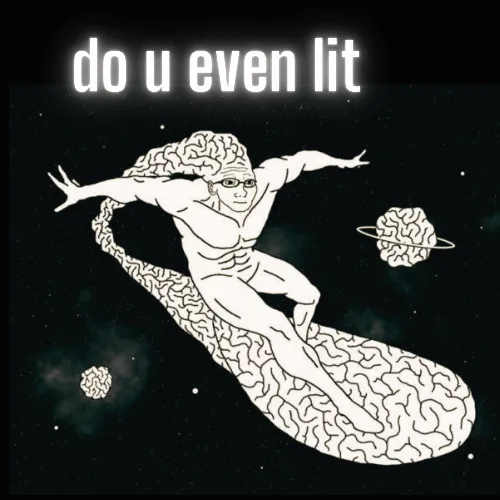
Do You Even Lit?
stemcel tragics use THE POWER OF FRIENDSHIP to read literary classics
- Update frequency
- every 10 days
- Average duration
- 74 minutes
- Episodes
- 47
- Years Active
- 2024 - 2025

Chekhov urself before u wreck-ov urself (The Little Trilogy)
This week we're reading three of Anton Chekhov's most beloved short stories: The Man in the Case, Gooseberries, and About Love (The Little Trilogy, 1898).
We get a minor assist from George Saunders a…

Ernest Hemingway's A Farewell to Arms: War and love
Hemingway's 1929 semi-autobiographical classic tackles two big timeless themes: love and war.
Two out of three of us can relate to the first one, but war feels pretty alien to us. How would the boys …

Crime and Punishment finale: is Dostoevsky...overrated??
Not too much plot to cover in parts 5 and 6; mostly we're hashing out our final thoughts on the book and Dostoevsky's legacy.
First up is the controversial epilogue. The boys are not sure how believa…

Crime and Punishment, part 2: Three extraordinary men
we're just normal men. We're just innocent men!
In parts 3 and 4 of Fyodor Dostoevsky's 1866 Crime and Punishment we get a lot more meat on Raskolnikov's 'extraordinary man' thesis.
How does it overl…

Crime and Punishment, part 1: Mister Schizo and the First Trad
Cracking into the first two parts of Dostoevsky's 1866 classic Crime and Punishment.
The first surprising thing is that this is a conservative/reactionary book: it mocks the fancy new ideas of the yo…

Susanna Clarke's Piranesi: Gaslight gatekeep girlboss
The beauty of this book is immeasurable, and its kindness is infinite.
We all love Susanna Clarke's 2012 metaphysical thriller, which feels like a mashup of Borges/C.S. Lewis/Gone Girl.
Venture deep…

The Tragedy of Hamlet: The O.G. annoying theatre kid
holy shit this was hard. Our first attempt at shakespeare and it was a doozy!
Rich struggled through the original text and only had the vaguest idea what was going on. Cam watched every single movie …

Albert Camus' The Fall: Signalling, scrupulosity, and pathological self-awareness
This one starts slow but it ends up being one of my favourite book clubs ever.
Camus' last finished novel was The Fall (1956). It has a lot of personal resonance for Rich and the other boys loved it …

Philip K. Dick's paranoid classic Ubik: Fluttering at the windowpane of reality
Philip K. Dick is a sci-fi legend, but the boys have only ever seen the film adaptations of his work (Blade Runner, Minority Report, A Scanner Darkly).
Dick's 1969 classic Ubik has us divided. Benny …

Franz Kafka's The Metamorphosis: A Bug's Life
“As Gregor Samsa awoke one morning from uneasy dreams he found himself transformed in his bed into an enormous insect.”
(who amongst us, etc)
This week we're talking Kafka's 1915 novella The Metamorp…

Frankenstein, part 2: Nature vs nurture
Wrapping up Mary Shelley's Frankenstein, which we all loved.
Nature vs nurture: the monster as proto-incel, to what extent do we feel sympathy for him, should Victor have made him a bride, self-loath…

Mary Shelley's Frankenstein, part 1: Post-nut clarity and forbidden knowledge
Discussing chapters 1-10 of Mary Shelley's 1818 genre mash-up Frankenstein.
On Mary Shelley's stacked genetics, the 'scenius' with Lord Byron and Percy Shelley, questions over authorship including a …

Samuel Beckett's Waiting for Godot: The One TRUE Interpretation
Wandering through Samuel Beckett's 1953 absurdist play Waiting for Godot.
Did Beckett actually have an interpretation in mind, or did he deliberately write a maximally vague story that everyone could…

The Razor's Edge, part 3: Climbing off the wheel of suffering
Our final session with W. Somerset Maugham's The Razor's Edge (chapters 5-7).
Elliot Templeton as the last relic of a dying age. Was he really happy? We consider his self-worship and clout-chasing Ca…

The Razor's Edge, part 2: Lay your hands on me Larry
Discussing chapters 4 and 5 of W. Somerset Maugham's The Razor's Edge.
Larry becomes aloof and reserved. Is he really bringing anything to the table besides his sexy forearms? Has he gone full woo-wo…

W. Somerset Maugham's The Razor's Edge, part 1: Nobody loafs like Larry
Cracking into the first three chapters of Maugham's 1944 spiritual odyssey.
Why do we love Larry so much? Rich talks about his own years of loafing around. Is Larry's decision to take a step off the …

Brief Interviews With Hideous Men, part 3: Was David Foster Wallace a hideous man?
Starts with light and breezy over-sharing of our masturbatory habits, ends with a downer discussion about how we should re-contextualise Wallace's work thru the lens of the abuse allegations against …

Brief Interviews With Hideous Men, part 2: If you can fake sincerity you've got it made
This week's discussion is loosely based around the story Octet, but really we just drill down on what David Foster Wallace is trying to achieve in this collection.
How much metafiction is too much me…

David Foster Wallace's Brief Interviews With Hideous Men, part 1: Weaponised therapy-speak
Wallace's 1999 collection of short stories takes us to some uncomfortable places (and as always, is eerily prescient).
In this week's discussion we talk about his 'juvenilia' coming-of-age story Fore…

Virginia Woolf's To the Lighthouse, part 3: We finally get to the fucking lighthouse
An anticlimactic final discussion to an anticlimactic book. We are confused and afraid. Cam is on the brink of quitting reading altogether.
This discussion covers Parts 2 and 3 of To The Lighthouse. …